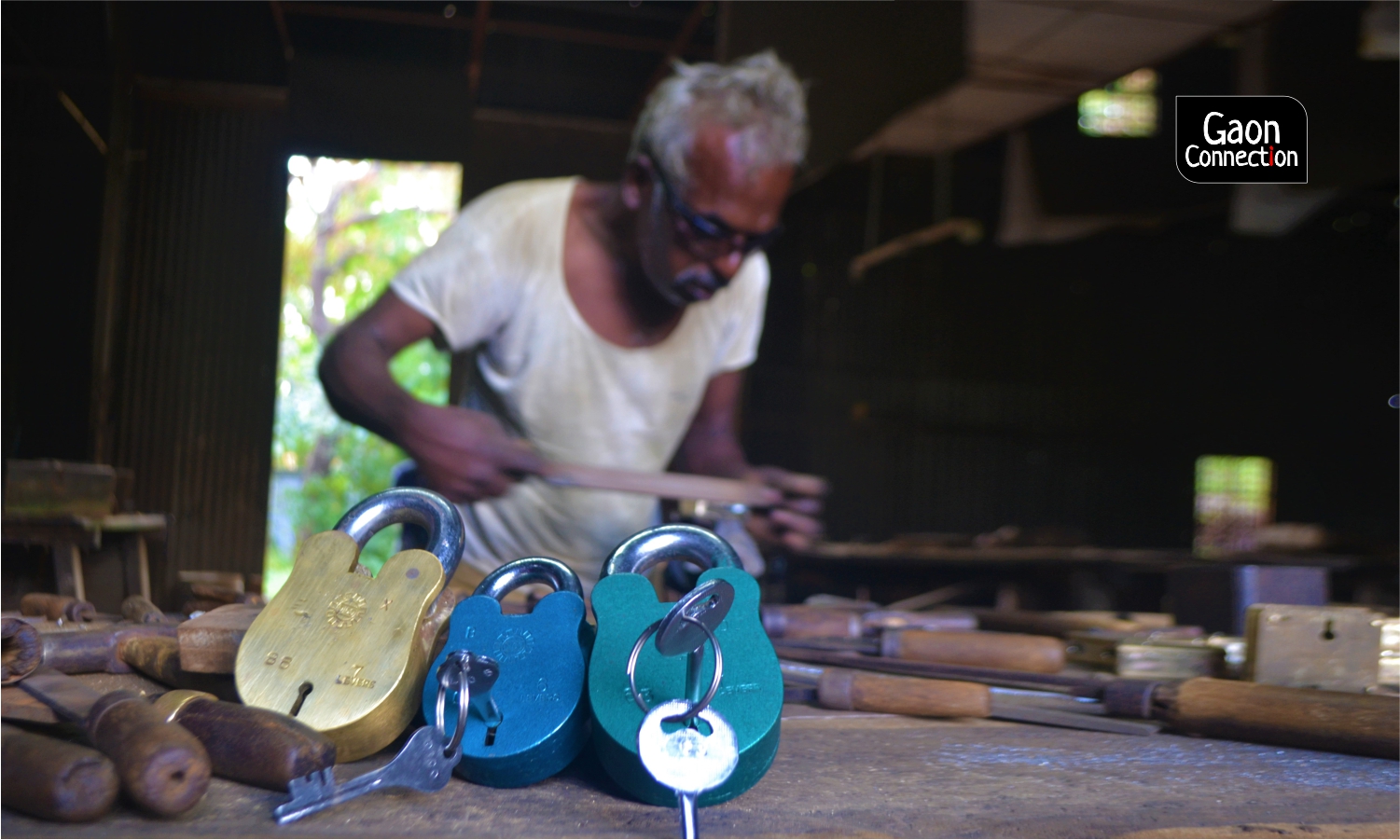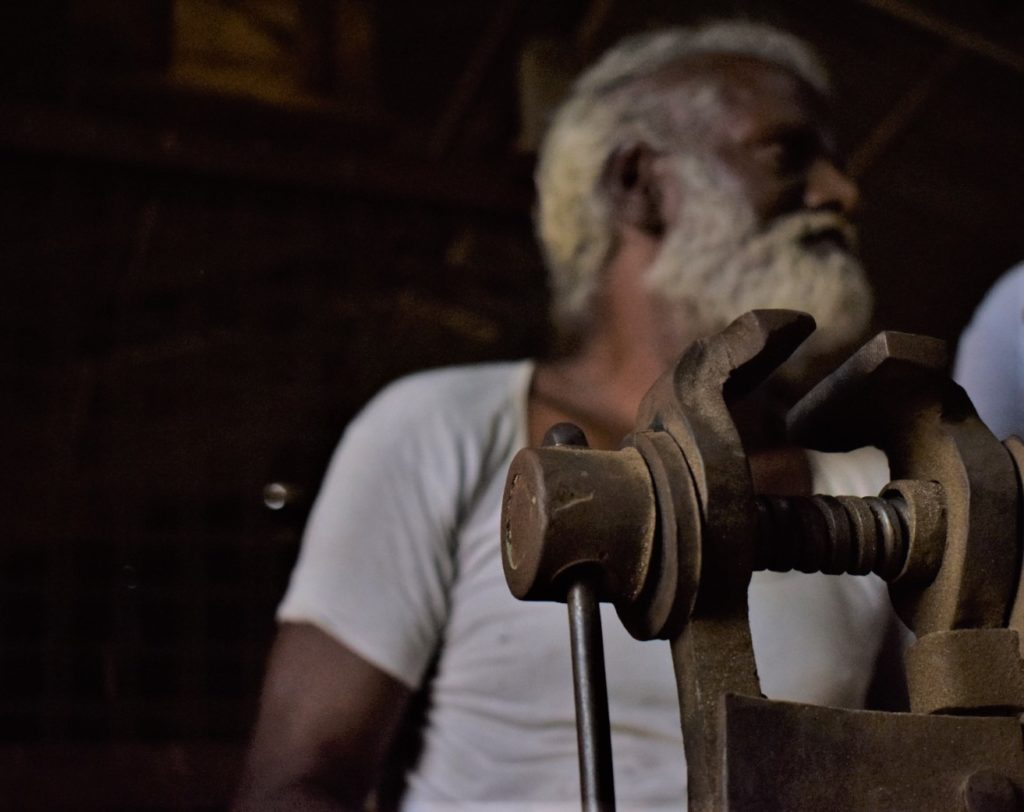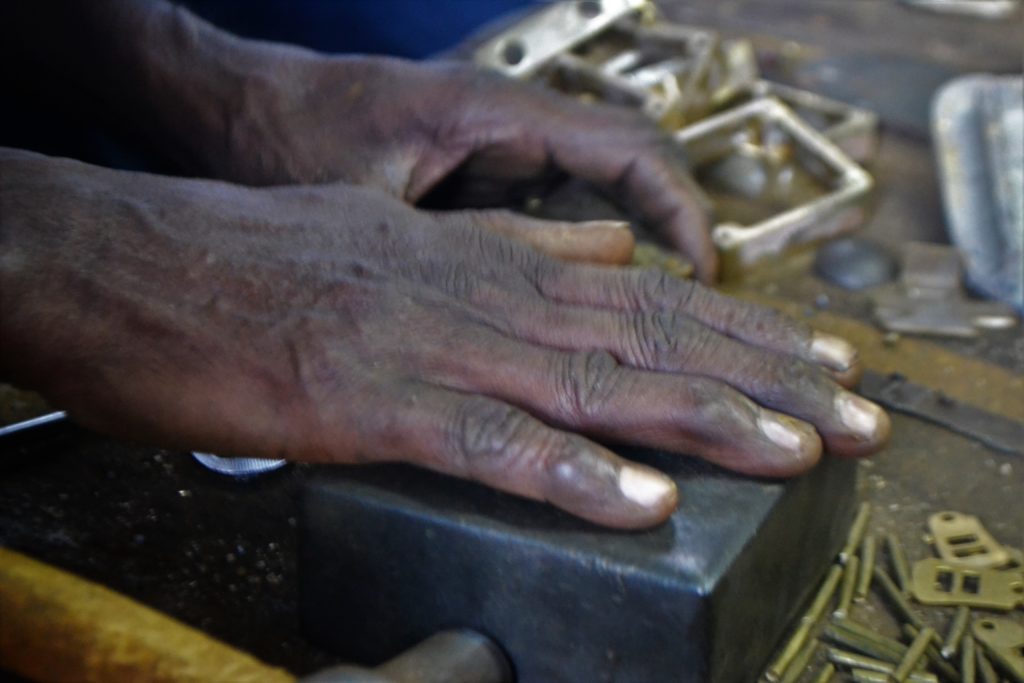Locked Out: What’s the key to restore the fading pride of Tamil Nadu’s Dindigul, the home of hand-fashioned locks?
Senior citizens drive the manufacture of the GI-tagged locks that have been around for nearly four centuries. They battle health issues but there’s a sense of bonhomie as they fashion the eponymous products.


Karupanna (70), the head of the factory, reshapes the body of the lock. This requires him to move his hands back and forth for over 20 minutes. Photo: Niki Sharma
Sexagenarian Nigithan has been making locks in a grungy old factory for over 40 years in Dindigul, Tamil Nadu. The factory with a tinned roof once had 60 lockmakers, but is now left with just six elderly workers.
“There was a time when 200 of 300 houses in Dindigul used our locks,” said Nigithan, 62, bending over a flimsy wooden table that shakes with every movement of his. Now, few in the city that lent its name to the lock use these hand-made beauties.

The lock making industry here is said to be nearly four centuries old, though it was regularised over a century ago. It earned a Geographical Indication (GI) tag in August 2019. However, an industry that was once the pride of Dindigul has seen its glory gradually fade. These six men have been holding on to the legacy of this craft in this factory, under The Dindigul Lock Workers’ Industrial Co-operative Society, established in 1957. It is packed with broken wooden tables, locks, and levers, all of which have a few stories to narrate.
This labour-intensive industry’s decline has left the workers in dire straits — the income is low and there is no one to hand over the legacy to. Yet, these men are willing to fight the industry’s downfall by contributing their skills, even after retirement.
After constantly moving his flat iron tool on the lock tightly clutched in his hand, Karupanna removed his eye gear to talk. “In 1985, around fifty to sixty workers were employed in this factory; now, only we are left,” said the 70-year-old, who is the head of the team. Most of them had retired but were requested by the government to continue working as the society had to function. Speaking about the shortage of labour, Karupanna said that they recently sold 275 locks to the Public Works Department. “But, we could not finish it on time because of fewer workers,” he added.

What adds to their woes is the decreasing demand for these legacy locks. The popularity of machine-made ones has sounded their death-knell for these locks, known for their ingenuity and clever use of keys. Some locks come with three keys, one to open, one to close and one that can both open and close. Some come with alarm systems that jam when someone tries to pick it. The mango lock made popular by them is known for its key combination, which has to be used in a specific order.
The raw materials used by the workers come from across the country. The lever, guide and keys come from Aligarh in Uttar Pradesh, and the sheets from Tirupur and Madurai in Tamil Nadu. From using the die-cast to mould the molten iron to shaping the sheets manually, these workers have been going hammer-and-tongs to make these locks. This is their livelihood, and they plod on.
To open these locks without a key, one has to disassemble them. The government buys these locks for the railways, prisons and dams. Each person makes five locks every day and earns Rs 76 for one lock. “People come and buy them from the factory,” said 60-year-old Venkatachalam, a factory worker. Most of the locks are made of either iron, brass or steel. The time taken to make a lock depends on the size. The small one takes about three hours. The 83 mm locks that weigh over 1.5 kg take the maximum time.
Venkatachalam does not want his children to become lockmakers. “One is a chef at a restaurant and the other works at a private hospital,” he said. The harsh working conditions in his field and meagre income are reasons why he does not want them doing this work.
The cooperative pays for hospital expenses, said Karupnana. However, they only receive half their pay when they call in sick. They work with heavy equipment and don’t use protective gear. So, they are prone to injuries.
“Nobody wants to be a lock manufacturer anymore,” said Venkatachalam with a detached gaze, even as he looked at the lock he was moulding.
With unique industries of this kind falling apart because of diminishing interest and returns, and advancement in technology, we perhaps know how this story will end. Unless, someone figures a key that will turn handmade locks popular again.
Niki Sharma is an independent journalist. This piece is based on a visit to the lock factories in January this year.

